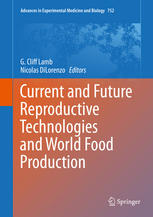

Most ebook files are in PDF format, so you can easily read them using various software such as Foxit Reader or directly on the Google Chrome browser.
Some ebook files are released by publishers in other formats such as .awz, .mobi, .epub, .fb2, etc. You may need to install specific software to read these formats on mobile/PC, such as Calibre.
Please read the tutorial at this link: https://ebookbell.com/faq
We offer FREE conversion to the popular formats you request; however, this may take some time. Therefore, right after payment, please email us, and we will try to provide the service as quickly as possible.
For some exceptional file formats or broken links (if any), please refrain from opening any disputes. Instead, email us first, and we will try to assist within a maximum of 6 hours.
EbookBell Team

4.3
88 reviewsThis book addresses the impacts of current and future reproductive technologies on our world food production and provides a significant contribution to the importance of research in the area of reproductive physiology that has never been compiled before. It would provide a unique opportunity to separate the impacts of how reproductive technologies have affected different species and their contributions to food production. Lastly, no publication has been compiled that demonstrates the relationship between developments in reproductive management tools and food production that may be used a reference for scientists in addressing future research areas. During the past 50 years assisted reproductive technologies have been developed and refined to increase the number and quality of offspring from genetically superior farm animal livestock species. Artificial insemination (AI), estrous synchronization and fixed-time AI, semen and embryo cryopreservation, multiple ovulation and embryo transfer (MOET), in vitro fertilization, sex determination of sperm or embryos, and nuclear transfer are technologies that are used to enhance the production efficiency of livestock species.